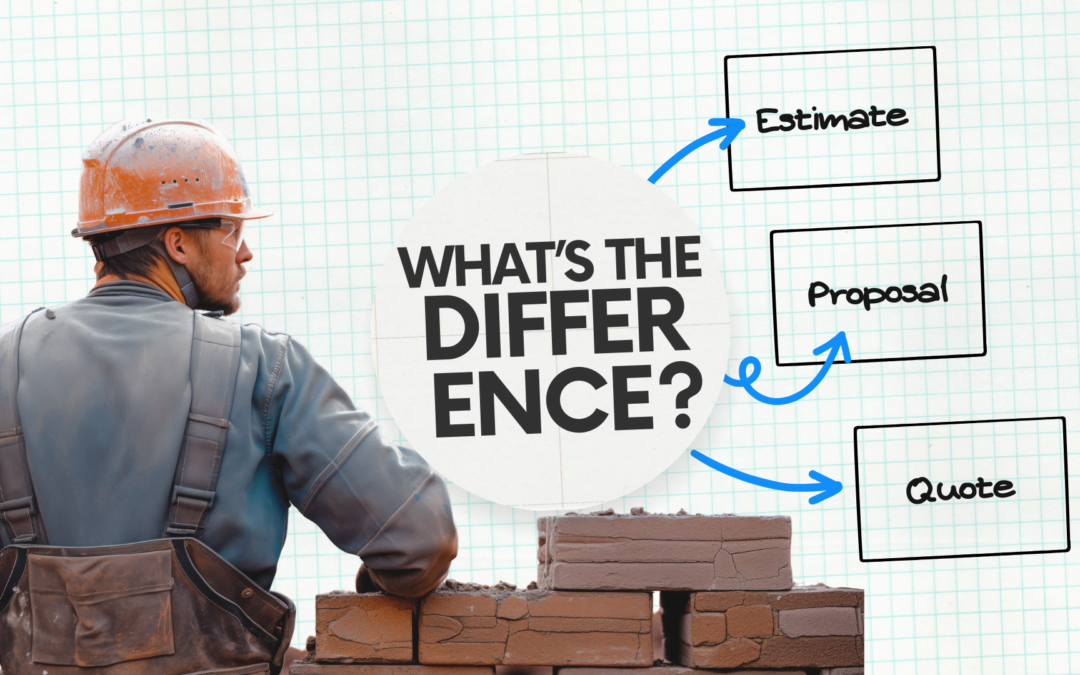In the construction industry, clear communication and precise cost management are essential for the success of any project. Understanding the differences between a contractor estimate vs. quote vs proposal can help ensure that projects run smoothly and stay within budget. These terms are often used interchangeably but have distinct meanings and applications that can significantly impact project outcomes. In this article, we’ll break down the differences and appropriate uses of each to help you manage your construction projects more effectively.
Communication is Key
The first thing to note is the importance of communication whether you are using the terms estimate, quote, or proposal. Effective communication is critical in construction, as location, background, and trade type can all play a role in how terms are understood and applied. I’ve said this in previous posts, but customers are not trained to be contractors! Clear and precise communication can prevent misunderstandings and help set accurate client expectations, ultimately improving project outcomes.
*you can steal some of these definitions when talking with customers through the sales process. This can help you communicate to your customers the difference between a contractor estimate vs. quote vs. proposal.
Brief Overview
Before diving into the details, let’s quickly compare estimates, quotes, and proposals with a simple graphic organizer:
| Aspect | Estimate | Quote | Proposal |
|---|---|---|---|
| Purpose | Approximate cost | Exact cost | Comprehensive project plan and cost |
| Detail Level | General | Detailed | Highly detailed, including project scope and timelines |
| Binding Nature | Non-binding | Legally binding | Often binding, depending on terms |
| Use Case | Early project planning | Confirming final costs before agreement | Comprehensive project overview and commitment |
What is a Contractor Estimate?
A contractor estimate is an approximate calculation of the costs associated with a construction project. It is typically provided early in the project planning stages to give clients a general idea of what the project might cost.
When to Use an Estimate
Estimates are useful during the initial discussions with potential clients. They help in gauging project feasibility and setting preliminary budgets. Estimates are not legally binding and are subject to change as project details become more defined.
What is a Contractor Quote?
A contractor quote is a detailed and fixed price for a construction project. Unlike an estimate, a quote is legally binding once accepted by the client. It includes a detailed breakdown of costs, including materials, labor, and other expenses.
When to Use a Quote
Quotes should be used when the project details are well-defined and both parties are ready to commit to specific terms. They are essential for finalizing contracts and ensuring that both the contractor and client have a clear understanding of the project costs.
What is a Contractor Proposal?
A contractor proposal is a comprehensive document that outlines the entire scope of a construction project. It includes detailed information about the project plan, timelines, materials, costs, and other relevant details. Proposals are often used in competitive bidding situations.
When to Use a Proposal
Proposals are ideal for complex projects where the client requires a detailed understanding of how the project will be executed. They are used to win contracts and demonstrate the contractor’s expertise and commitment to delivering quality work. Proposals are often used in public works projects, commercial jobs, or development projects.
The only constant is change.
Change orders are important for any construction project.
In construction, change orders are modifications to the original contract. They can result from unforeseen issues, client requests, or other factors. Managing change orders effectively is crucial to maintaining project timelines and budgets. A well-handled change order process ensures that both the contractor and client are on the same page and that the project’s financial health is preserved.
Ensuring change orders are signed and approved by the customer, and communication is clear as to why a change order is needed, can lead to satisfied customers, and increased profit margins.
Conclusion
Contractor estimate vs quote vs proposal
Understanding the differences between estimates, quotes, and proposals can significantly impact the success of your construction projects. Each serves a unique purpose and is suited to different stages of the project lifecycle. By effectively utilizing these tools and maintaining clear communication with clients, you can ensure more accurate budgeting, better project management, and ultimately, greater success in the construction industry.
Some contractors, especially in the residential construction industry, use these phrases interchangeably. Make sure your customers have clear expectations of the documents you are sending, and be sure to collect a signature before starting work on any project.
Implement the principles outlined above, and your company can thrive in the top 4% of businesses in the construction industry.
Contractor estimate & quote software.
For estimates, quotes and proposals
Estimating and quote creation can be time-consuming, and streamlining this process can significantly increase sales and productivity.
Projul offers an excellent solution for creating templates, collecting digital signatures, attaching photos and files, and presenting professional estimates and quotes to your customers. See if estimating software like Projul can help your company increase revenue and make more sales.
